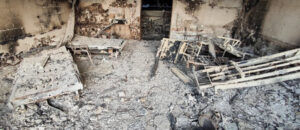Nabil Kuhail, 3 years old, sat on a bed inside the European Hospital in Khan Younis. His grandmother, who took care of him after he lost 24 family members, sat beside him. She attempted to narrate the story of her grandson’s slow death before her eyes, crying more than she spoke. A local reporter recorded her appeal to rescue her grandson, who fell ill due to the new conditions of displacement and pollution in their shelters and tents.
Nabil’s grandmother, Fatima Kuhail, said that at the beginning of the war, the family had been able to protect their only child, managing to meet his needs until the signs of continuous displacement and living in tents started to take their toll on him. A rash, loss of appetite, sleeping for long hours, and lethargy overtook him. The family took the child to a hospital in Rafah before the Israeli invasion of the city. After a long process, the doctors diagnosed him, but could not offer proper medical care.
“The doctors here are doing their best to rescue the boy, but they do not have anything more to offer. This is the extent of their ability,” Fatima said in the video, crying. “The boy must be transferred to a more advanced hospital to receive his treatment, but it’s also hard in the war; doctors are telling me that they put his name on the top priority for treatment abroad.”
Nabil’s diagnosis was leukemia, which resulted in an enlarged liver and spleen. “When we figured it out, we did not believe it. We still do not want to believe that we might lose him,” Fatima continued. “He is filling our lives with joy. We will all be killed if we lose him.”
When the war started, Nabil’s family was displaced from the north of Gaza to the south. When the family first started living in tents, Nabil still didn’t exhibit any symptoms. But later, as he engaged with the environment around him, the symptoms began to show.
“Suddenly, the rash appeared on his body due to the mosquito bites and because of playing in the streets with cats and dogs,” Fatima explained, saying his situation only continued to deteriorate. “Every day, he’s getting worse. In his last blood test, his hemoglobin was 9, and now after 4 days, it’s 6. The boy is dying, and we can’t do anything about it.”
“It’s killing me to see him in pain and to be unable to help him,” she said. “He’s always screaming and saying that his feet are on fire.”
Shortly after the interview with Fatima spread on social media, Nabil was eventually able to travel out of Gaza and was transferred to Augusta Victoria Hospital in Jerusalem. Two days after arriving, he died. He was sent back to Gaza for burial.
Nabil’s story is one among many. Countless patients have struggled to get treatment for a variety of illnesses, from the serious to the commonplace, making the latter often as deadly as the former.
No official list exists of people who died in Gaza during the war as a result of their inability to receive medical treatment. Gaza’s collapsing health system has barely been able to keep up with counting those who have been directly killed by Israel.

